Sound Bites - Issue #19 - March 2015

Issue #19 March | 2015
Community Education's Premiere Online Magazine
In This Issue:
- 11-Month Paralegal Academy Opens March 23!
- What's New: The Drought's Silver Lining
- Bridge to Excellence!
- Ayurveda Seasonal Cleanse + Bonus Healthy Recipe!
11-Month Paralegal Academy Opens March 23!
 Michelle King, Director
Michelle King, DirectorCareer & Contract Ed.
We are pleased to announce the launch of our first-ever Paralegal Academy, a program that will train students for careers in a fast-growing field in just 11 months.
Classes begin March 23 and will be held Monday and Wednesday evenings from 6:30 to 9:30 p.m. and most Saturdays from 9 a.m. to 1 p.m. A certificate of completion is awarded upon successful completion of the course and qualifies our students to work as paralegals under a licensed attorney in California. The cost is $294 a month.
Our program's 400-plus hours of instruction focus on developing students' critical thinking and analytical skills and preparing them to handle day-to-day tasks and responsibilities in ANY type of law practice.
Employment of paralegals and legal assistants is projected to grow 17 percent from 2012 to 2022, faster than the average for all occupations, according to the U.S. Bureau of Labor Statistics.
The new program is headed up by Ric Riccobono, an attorney with 35 years of experience who directed a similar program at Los Angeles Valley College.

The program is distinguished from other programs in offering a wider variety of courses that prepare students much more effectively for their careers.
In addition, the program – at 11 months – is longer than some that take about four months but those students don't have enough training to comply with California law to be practicing paralegals. Other programs can take two to three years, and students earn associate or bachelor degrees as well. Credits from the SMC program can be transferred towards a two- or four-year degree at colleges such as Empire College in New York and Bellevue University in Nebraska, both of which offer online degrees.
Studies have shown that paralegals generally start at about $40,000 a year, climbing to $60,000 within five years and $70,000 to $100,000 after seven years.
Registration for the Paralegal Academy is online at www.legalfieldcareers.com. For more information, call (310) 434-3400 or email commed@smc.edu.
Warm regards,
Michelle King
Director of Career & Contract Education
What's New: The Drought's Silver Lining
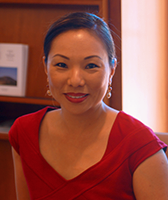 Alice Meyering,
Alice Meyering,Program Coordinator
Community & Contract Education
This winter has felt more like summer in Los Angeles, underlining the severe drought we've been having, despite a couple good rains earlier this month.
But the drought comes with some good news of sorts. The Los Angeles Department of Water & Power has its California Friendly® Landscape Incentive Program, providing rebates for homeowners who remove thirsty lawns and replace them with California Friendly plants, mulch, and permeable pathways.
And to help homeowners, we are offering a 4-hour "Drought Tolerant Landscaping" workshop on May 22 that will be taught by Charlotte Chen. She recently told me how her class will assist homeowners pick the right landscape designer and contractor and avoid costly problems.
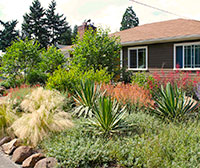 Photo courtesy of mylandscapeplan.com
Photo courtesy of mylandscapeplan.com"I lived in South Pasadena long ago when drought tolerant gardens were not mandatory," said Charlotte, who has more than 30 years experience in the business. "Most were not prepared properly and had to be redone, costing the home owner more money.
"Aside from ensuring the proper use of plants, a good drought tolerant landscaping plan will also take into consideration that the 'hardscape' is not only aesthetically pleasing but is also functional," she continued.
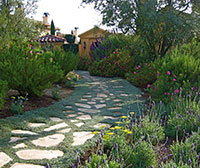 Photo courtesy of mylandscapeplan.com
Photo courtesy of mylandscapeplan.com
"Preparation is most important. Without it, you could end up with costly repairs. Students in my class will come away with some knowledge about what to look for when working with a designer and contractor. "
For me, it's rewarding that we can provide valuable information and guidance in a workshop such as Charlotte's – and at the same time, help the environment.
Bridge to Excellence!

Some people might think that the game of Bridge is a relic of the past, a ritual of 1950s- and 1960s-era housewives.
On the contrary, Bridge – the "live" version, not computer or online games – is alive and well. In fact, enthusiasts around the world have established highly structured organizations around the card game.
And nobody knows more about this than Candace "Candy" Scott, who not only teaches Beginning and Intermediate Bridge classes at Community Ed, she also offers "Candy's Bridge Club" through the program.
Scott, who has been teaching Bridge since 1980 to students ranging from 8 to 105 years old, is very active in the rarefied world of the game – and has received honors for her game skills and volunteerism.
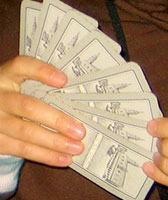
"The American Contract Bridge League is made up of 26 Districts. Los Angeles is District 23 and I am the Corresponding and Recording Secretary," Scott says. "I am a Gold life Master, a Certified Bridge teacher and a member of the National Goodwill Committee."
Her honors have included Volunteer of the Year and Player of the Year.
Though Bridge is a big part of her life, she has many other interests and achievements.
"I love to cook and am proud to have been the editor of a cookbook of 30 years of recipes from Bridge players of the Los Angeles District," she says. "I would love to give any student a copy of my labor of love."
She continues, "I have learned American Sign Language and have been given the Mordichai Award for being a hearing person who is a liaison between the deaf and hearing communities. I have worked with the Los Angeles Mayor's office in their yearly Deaf Festival with a booth where deaf and hearing children and their families can interact."
Ayurveda Seasonal Cleanse + Bonus Healthy Recipe!
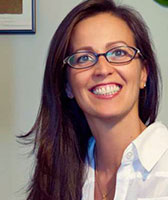 Lois Leonhardi
Lois LeonhardiSMC Community Ed is pleased to offer a brand new class, "Ayurveda Spring Cleanse Retreat," to be taught by Lois Leonhardi. The three-day urban retreat will be held April 24-26 (Friday evening and full days Saturday and Sunday) at our Bundy Campus.
The following is a Q-&-A with Lois Leonhardi. (At the end is a link to a free recipe for French lentil stew created by Lois.)
What is Ayurveda?
Ayurveda is an ancient, holistic system of medicine from India that has been used successfully for thousands of years. It emphasizes preventing disease using diet and lifestyle recommendations tailored to the individual. Seasonal cleansing based on an individual's body type was an important practice. It was used to clear toxins, prolong life and rejuvenate. Many consider cleansing to be equivalent to drinking from the "fountain of youth!"
Why do we need to cleanse?
Lots of reasons! Stress, wrong diet, depleting lifestyle, repressed emotions, seasonal changes and environmental pollutants impact our state of balance. When we are imbalanced, our agni (digestive fire or metabolism) becomes impaired which can result in unprocessed food, thoughts or emotions. Unprocessed foods, thoughts and emotions create ama (a Sanskrit word that refers to physical and emotional toxins).
Ama is a sticky glue-like substance that enters the blood stream and clogs channels as it accumulates throughout the body. If left unchecked, it eventually results in disease. Ayurveda recommends periodic removal of ama via seasonal cleansing. Seasonal cleansing kindles agni and draws physical and emotional ama out of the tissues and into the GI tract for elimination. This restores balance to our body and mind allowing for natural cellular rejuvenation and a return to our youthful glow.
What are the best times to cleanse?
Seasonal transitions – especially spring and fall – are the best times to cleanse. Spring cleansing will flush stagnant physical and emotional energy and ama accumulated during the winter months. It prepares you for new growth for the year ahead. Cleansing during the fall removes excess heat in the body accumulated during the summer and prepares the body for winter. Seasonal cleanses can set in motion the following actions:
- Elimination of toxins (physical and emotional) from your body
- Strengthening of the immune system (via kindling agni and resetting the internal clock)
- Removal of mental stress (restoring deep relaxation and mental clarity)
- Cellular regeneration (resulting in a youthful radiance and vigor)
What is the traditional cleanse routine?
Ayurveda treats each individual as unique so the cleanse routine will vary per individual (i.e., depending on their unique needs and circumstances). In general, a traditional cleanse consists of three phases:
Preparation (one day to several weeks), cleansing (one day to several months) and rejuvenation (one week to several month). The preparation phase and rejuvenation phases are essential elements to the program and are the key to lasting positive change.
A mono-diet of kitchari (a stew made of mung dal and basmati rice) is recommended during the cleanse. The kitchari recipe is modified depending on the season and the individual. Kitchari is light and easy to digest. It stokes the digestive fire, which, during a cleanse, is busy processing ama that has been pulled into the GI tract.
Herbal tonics, teas and ample water throughout the day are also advised to facilitate the process. The ancients viewed foods, spices and herbs as medicine; these were strategically used in alignment with the season and individual's constitution to maximize cleanse results.
The cleanse was done in a setting that cultivated internal peace and clarity. Unplugging from the daily routine and spending time walking in nature, meditating and doing restorative yoga helped to remove mental toxins and restore a sense of calm.
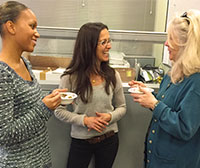 Jocelyn Winn (left) and student Jodi Shannahan (right) chat with Lois Leonhardi while enjoying her homemade French lentil stew
Jocelyn Winn (left) and student Jodi Shannahan (right) chat with Lois Leonhardi while enjoying her homemade French lentil stew
How does this provide rejuvenation?
By removing physical impurities and releasing destructive thought patterns and behaviors, the body, mind and spirit are rejuvenated. The beauty of this holistic approach is that by working in sync with the rhythms of nature, our body's internal clock can "reset." The body intuitively adapts to this restored state of balance. With a renewed sense of awareness, you will instinctively seek healthier diet and lifestyle choices creating lasting results. Try for yourself and experience the benefits!
Are there any precautions we should be aware of?
Ayurvedic cleanses are gentle, but for best results, it is recommended that they be done under the supervision of an Ayurveda Practitioner. You don't want to do this from a YouTube video!
Ayurvedic cleanses are tailored to the season and individual. They are modified according to an individual's current state of health; types of medications/herbs currently in use; medical conditions (i.e., high BP, cholesterol, bi-polar, depression, hypertension, etc.); amount of ama, etc. The spring cleanse retreat that we will be doing at SMC will be "food based" – we will not be taking any herbs. The spring cleanse workshop is not intended to diagnosis or treat any health problem. As a precaution, you should always consult with your healthcare professional before taking any medication or herbs or making dietary changes especially if you are pregnant or if you have, or suspect you might have, a health problem.
Tell us a little about yourself.
I am a Certified Ayurveda Practitioner, educator and author of "Eat Well, Be Well: Ayurveda Cooking for Healthy Living." I trained under Dr. Lad at the Ayurvedic Institute in New Mexico and in Pune, India. I have more than 20 years of experience in holistic studies including ayurveda, yoga and Buddhism. By following the ancient practice of integrating yoga with ayurveda, I will help you achieve balance in your modern life. I'm based in Los Angeles and there's more at my website, www.yogawithlois.com.
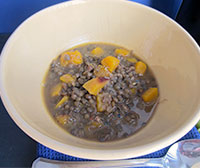 Lois' Mirpoix Lentil Stew with Kabocha
Lois' Mirpoix Lentil Stew with KabochaCLICK HERE for Lois' Mirpoix Lentil Stew with Kabocha
 Donate Today!
Donate Today!
